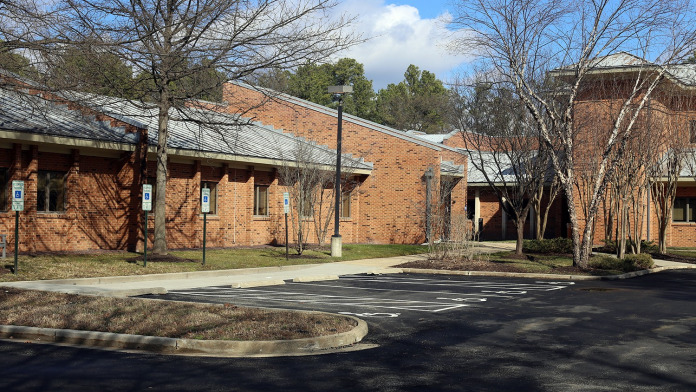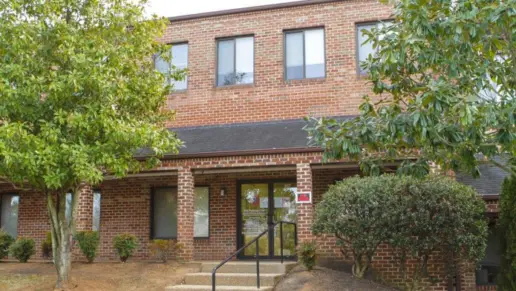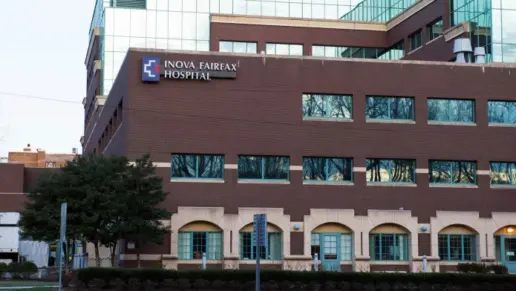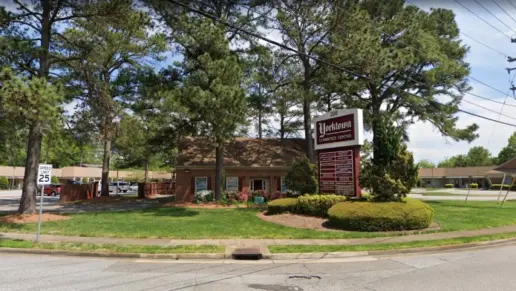Front desk staff is pretty intense when trying to enlist you up, but it is more like a police interrogatory. The way they work with you is kinda mean, they try to make you feel bad for your decisions and humiliate you constantly.
About Henrico Area Mental Health
Henrico Area Mental Health is a government run behavioral health program for residents of Henrico County in Virginia. They support adults struggling with mental health issues, substance use disorder and dual diagnosis. Henrico Area Mental Health has their main office in Glen Allen, Virginia.
They’re located 12 miles north of the state capital Richmond. If you’re driving you can take I-95 North from Richmond and hop onto I-295 West toward Charlottesville. Then take exit 45B for Woodman Road North and continue. Their main office sits on the right of Woodman Road. The whole journey will take roughly 20 minutes. It’s roughly the same driving time when coming from Ashland and Mechanicsville.
The GRTC runs bus services in the Richmond area but direct access to the facility might be limited. Always check the GRTC’s scheduling and routes for precise planning if you’re relying on public transportation.
Henrico Area Mental Health promotes healing among adults dealing with substance use or dual diagnoses through personalized care that builds dignity, recovery and independence. They support same day access to care. You’ll first undergo an assessment during intake. This forms the basis of the individualized treatment that guides your healing journey.
They’ll refer you to community providers for detox or residential treatment if your assessment meets the ASAM criteria for those care levels. Otherwise, you’ll be treated through their outpatient program.
These involve therapy groups alongside individual counseling and substance use educational classes. The therapy sessions use many evidence based models to effect recovery. This ranges from MRT and DBT skills to CBT, seeking safety and matrix models. Urine drug screening may be involved to monitor treatment progress.
Your personalized care may include medication-assisted recovery if you’ve an opioid addiction. This means using FDA approved meds to manage withdrawal symptoms and cure cravings. This technique is the foundation of their standalone office based opiate treatment (OBOT).
They can prescribe Suboxone, Vivitrol or Campral depending on your personalized care. They’ll even offer a referral to a methadone maintenance clinic within the community if appropriate. This program also involves case coordination and behavioral therapy to help you address the underlying emotional issues fueling your opioid use.
Peer support is an integral aspect of their outpatient treatment, outreach and community education efforts. Peer specialists with lived recovery experience can help by offering guidance, sharing personal insights and providing support where needed.
Henrico Area Mental Health provides Specialized evidence based outpatient therapy for women. This program prioritizes pregnant and post-partum women who are using drugs or alcohol. The therapy sessions cover relapse prevention, self-care and relationship/intimacy. They address healthy boundaries, parenting and domestic violence/abuse as well.
Program participants are linked to community resources that support sustained recovery. This includes stable or supportive housing, medical care and vocational assistance. Case managers can also help with childcare, care coordination and identification of social support.
The facility ensures well-rounded care that also includes onsite medical services through a partnership with Daily Planet. Clinical staff can connect you to medical services and share info on various infectious diseases during your same day access appointment. These include hepatitis, HIV and TB.
The facility also supports the Recovery in a Secure Environment (RISE) program at the Henrico Regional Jail. They offer case management to offenders participating in substance use diversion services.
Prevention and harm reduction education is available in this facility as well. This includes in person and virtual training on administering Narcan. Narcan is used to prevent opioid overdoses and frequently saves lives.
Latest Reviews
Rehab Score
Gallery

Location
Other Forms of Payment
Medicaid is a state based program that helps lower-income individuals and families pay for healthcare. Medicaid covers addiction treatment so those enrolled can use their coverage to pay for rehab. When a program accepts Medicaid the client often pays very little or nothing out of their own pocket.
Private insurance refers to any kind of healthcare coverage that isn't from the state or federal government. This includes individual and family plans offered by an employer or purchased from the Insurance Marketplace. Every plan will have different requirements and out of pocket costs so be sure to get the full details before you start treatment.
Self-pay involves paying for treatment out of your own pocket. You can use savings or credit, get a personal loan, or receive help from family and friends to fund your treatment. If you don't have insurance or your insurance plan doesn't cover a specific program, self-pay can help ensure you still get the care you need.
Financial aid can take many forms. Centers may have grants or scholarships available to clients who meet eligibility requirements. Programs that receive SAMHSA grants may have financial aid available for those who need treatment as well. Grants and scholarships can help you pai for treatment without having to repay.
Sliding scale payments are based on a client's income and family size. The goal is to make treatment affordable to everyone. By taking these factors into account, addiction recovery care providers help ensure that your treatment does not become a financial burden to you or your family, eliminating one barrier to care.
Medicare is a federal program that provides health insurance for those 65 and older. It also serves people under 65 with chronic and disabling health challenges. To use Medicare for addiction treatment you need to find a program that accepts Medicare and is in network with your plan. Out of pocket costs and preauthorization requirements vary, so always check with your provider.
Military members, veterans, and eligible dependents have access to specific insurance programs that help them get the care they need. TRICARE and VA insurance can help you access low cost or no cost addiction and mental health treatment. Programs that accept military insurance often have targeted treatment focused on the unique challenges military members, veterans, and their families face.
Addiction Treatments
Levels of Care
Treatments
Many of those suffering from addiction also suffer from mental or emotional illnesses like schizophrenia, bipolar disorder, depression, or anxiety disorders. Rehab and other substance abuse facilities treating those with a dual diagnosis or co-occurring disorder administer psychiatric treatment to address the person's mental health issue in addition to drug and alcohol rehabilitation.
Mental health rehabs focus on helping individuals recover from mental illnesses like bipolar disorder, clinical depression, anxiety disorders, schizophrenia, and more. Mental health professionals at these facilities are trained to understand and treat mental health issues, both in individual and group settings.
Programs


Clinical Services
Cognitive Behavioral Therapy (CBT) is a therapy modality that focuses on the relationship between one's thoughts, feelings, and behaviors. It is used to establish and allow for healthy responses to thoughts and feelings (instead of unhealthy responses, like using drugs or alcohol). CBT has been proven effective for recovering addicts of all kinds, and is used to strengthen a patient's own self-awareness and ability to self-regulate. CBT allows individuals to monitor their own emotional state, become more adept at communicating with others, and manage stress without needing to engage in substance abuse.
Whether a marriage or other committed relationship, an intimate partnership is one of the most important aspects of a person's life. Drug and alcohol addiction affects both members of a couple in deep and meaningful ways, as does rehab and recovery. Couples therapy and other couples-focused treatment programs are significant parts of exploring triggers of addiction, as well as learning how to build healthy patterns to support ongoing sobriety.
Dialectical Behavior Therapy (DBT) is a modified form of Cognitive Behavioral Therapy (CBT), a treatment designed to help people understand and ultimately affect the relationship between their thoughts, feelings, and behaviors. DBT is often used for individuals who struggle with self-harm behaviors, such as self-mutilation (cutting) and suicidal thoughts, urges, or attempts. It has been proven clinically effective for those who struggle with out-of-control emotions and mental health illnesses like Borderline Personality Disorder.
Experiential therapy is a form of therapy in which clients are encouraged to surface and work through subconscious issues by engaging in real-time experiences. Experiential therapy departs from traditional talk therapy by involving the body, and having clients engage in activities, movements, and physical and emotional expression. This can involve role-play or using props (which can include other people). Experiential therapy can help people process trauma, memories, and emotion quickly, deeply, and in a lasting fashion, leading to substantial and impactful healing.
Research clearly demonstrates that recovery is far more successful and sustainable when loved ones like family members participate in rehab and substance abuse treatment. Genetic factors may be at play when it comes to drug and alcohol addiction, as well as mental health issues. Family dynamics often play a critical role in addiction triggers, and if properly educated, family members can be a strong source of support when it comes to rehabilitation.
Group therapy is any therapeutic work that happens in a group (not one-on-one). There are a number of different group therapy modalities, including support groups, experiential therapy, psycho-education, and more. Group therapy involves treatment as well as processing interaction between group members.
In individual therapy, a patient meets one-on-one with a trained psychologist or counselor. Therapy is a pivotal part of effective substance abuse treatment, as it often covers root causes of addiction, including challenges faced by the patient in their social, family, and work/school life.
Trauma therapy addresses traumatic incidents from a client's past that are likely affecting their present-day experience. Trauma is often one of the primary triggers and potential causes of addiction, and can stem from child sexual abuse, domestic violence, having a parent with a mental illness, losing one or both parents at a young age, teenage or adult sexual assault, or any number of other factors. The purpose of trauma therapy is to allow a patient to process trauma and move through and past it, with the help of trained and compassionate mental health professionals.
Contact Information
10299 Woodman Road
Glen Allen, VA 23060


